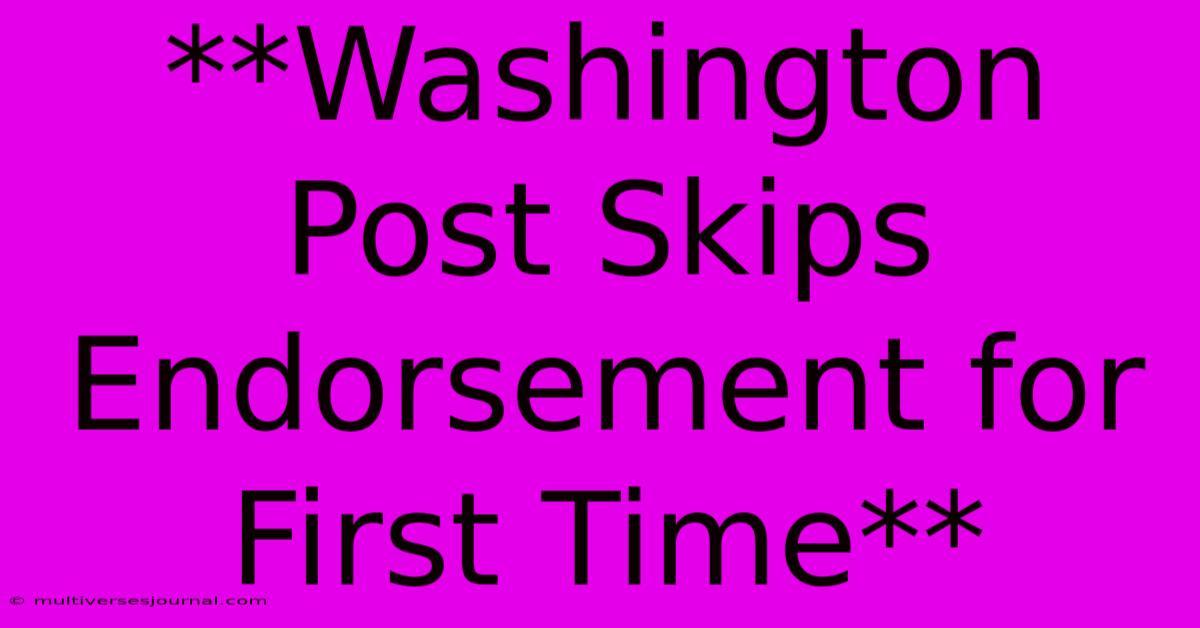**Washington Post Skips Endorsement For First Time**

Discover more detailed and exciting information on our website. Click the link below to start your adventure: Visit Best Website multiversesjournal.com. Don't miss out!
Discover more detailed and exciting information on our website. Click the link below to start your adventure: Visit Best Website mr.cleine.com. Don't miss out!
Table of Contents
Washington Post Skips Endorsement for First Time: A Sign of the Times?
The Washington Post, a prominent voice in American journalism, has made a historic decision: for the first time in its 143-year history, it will not endorse a candidate for president in the upcoming 2024 election. This unprecedented move has sparked widespread debate, prompting questions about the future of political endorsements in the age of increasingly polarized politics.
A Break from Tradition
The Post has a long and storied history of endorsing candidates, dating back to the 1880s. Over the years, it has supported both Democrats and Republicans, including notable figures like Franklin D. Roosevelt and Ronald Reagan. The paper's endorsements have often carried significant weight, influencing voters and shaping public discourse.
However, in recent years, the practice of endorsing candidates has come under scrutiny. Critics argue that endorsements can alienate readers and contribute to the growing political divide. Others contend that they are a valuable tool for holding candidates accountable and guiding voters towards informed decisions.
Reasons for the Decision
The Post's decision to forgo an endorsement is a complex one, likely influenced by several factors:
- The current political climate: With polarization at an all-time high and distrust in institutions growing, the Post may have concluded that an endorsement would further divide its readership.
- The evolving role of media: In the digital age, where news is consumed through a multitude of sources, the influence of traditional media outlets, including newspapers, has diminished.
- Concerns about neutrality: The Post may have decided that an endorsement would compromise its journalistic integrity and neutrality, particularly in light of the heightened scrutiny surrounding media bias.
The Future of Endorsements
The Post's decision is a significant development, raising questions about the future of political endorsements in the media landscape. While some outlets may continue the practice, others may follow suit, prioritizing neutrality and engaging with their audiences in new ways.
This move could also mark a shift in the relationship between the media and the public. Instead of offering endorsements, news organizations might focus more on providing in-depth coverage and analysis of the candidates and issues, allowing readers to form their own conclusions.
The Washington Post's decision to skip an endorsement represents a pivotal moment in the history of journalism and the relationship between the media and its audience. Only time will tell what impact this unprecedented move will have on the future of political endorsements and the evolving landscape of media in the digital age.

Thank you for visiting our website wich cover about **Washington Post Skips Endorsement For First Time**. We hope the information provided has been useful to you. Feel free to contact us if you have any questions or need further assistance. See you next time and dont miss to bookmark.
Thank you for visiting our website wich cover about **Washington Post Skips Endorsement For First Time**. We hope the information provided has been useful to you. Feel free to contact us if you have any questions or need further assistance. See you next time and dont miss to bookmark.
Featured Posts
-
Kelsea Ballerinis Netflix Pick What Is It
Oct 26, 2024
-
Rogan Podcast Trump Aims For Young Male Voters
Oct 26, 2024
-
Trumps Upcoming Rogan Interview Details
Oct 26, 2024
-
Post Announces No Presidential Endorsements For 2024
Oct 26, 2024
-
Texas Harris And Beyonce Trump And Rogan
Oct 26, 2024
